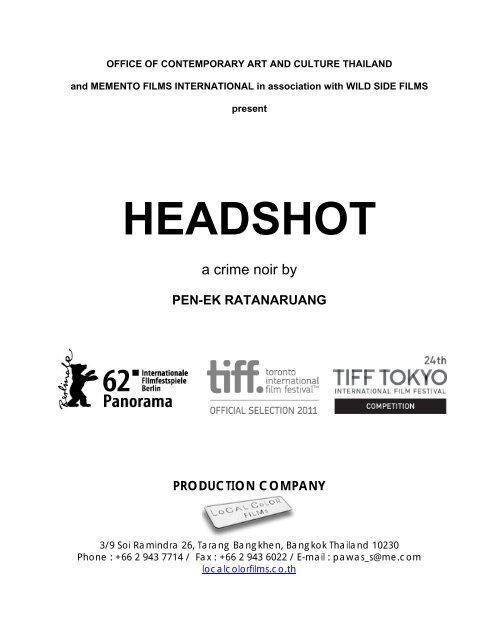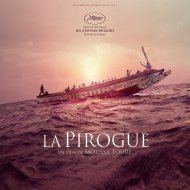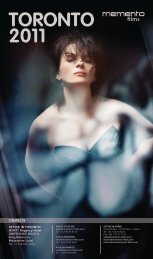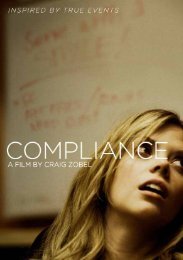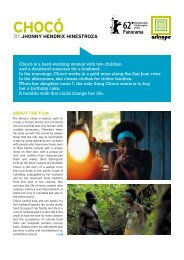Headshot Presskit FINAL - Memento Films International
Headshot Presskit FINAL - Memento Films International
Headshot Presskit FINAL - Memento Films International
Create successful ePaper yourself
Turn your PDF publications into a flip-book with our unique Google optimized e-Paper software.
OFFICE OF CONTEMPORARY ART AND CULTURE THAILAND<br />
and MEMENTO FILMS INTERNATIONAL in association with WILD SIDE FILMS<br />
present<br />
HEADSHOT<br />
a crime noir by<br />
PEN-EK RATANARUANG<br />
PRODUCTION COMPANY<br />
3/9 Soi Ramindra 26, Tarang Bangkhen, Bangkok Thailand 10230<br />
Phone : +66 2 943 7714 / Fax : +66 2 943 6022 / E-mail : pawas_s@me.com<br />
localcolorfilms.co.th
With funding from the Office of Contemporary Art and Culture Thailand<br />
In association with Wild Side <strong>Films</strong><br />
With the support of the Göteborg <strong>International</strong> Film Festival Fund<br />
In co-operation with Tokyo Project Gathering<br />
INTERNATIONAL SALES AGENT<br />
9 cité Paradis, 75010 Paris, France<br />
Phone : +33 1 53 34 90 20 / Fax : +33 1 42 47 11 24 / E-mail : festival@memento-films.com<br />
international.memento-films.com
Specifications<br />
Original Title:<br />
Based on the Novel by:<br />
Production Company:<br />
Writer/Director:<br />
Producers:<br />
Associate Producers:<br />
Director of Photography:<br />
Editor:<br />
Production Designer:<br />
Costume Design:<br />
Sound Designer:<br />
Music:<br />
Cast<br />
Tul:<br />
Rin:<br />
Joy/Tiwa:<br />
Torpong:<br />
Dr. Suang:<br />
Fon Tok Kuen Fah<br />
Win Lyovarin<br />
Local Color <strong>Films</strong> Co., Ltd.<br />
Pen-ek Ratanaruang<br />
Pawas Sawatchaiyamet, Raymond Phathanavirangoon<br />
Emilie Georges, Tanja Meissner<br />
Chankit Chamnivikaipong<br />
Patamanadda Yukol<br />
Wittaya Chaimongkol<br />
Visa Kongka<br />
Akritchalerm Kalayanamitr<br />
Vichaya Vatanasapt<br />
… Nopachai “Peter” Jayanama<br />
… Celine “Cris” Horwang<br />
… Chanokporn “Dream” Sayoungkul<br />
… Apisit “Joey Boy” Opasaimlikit<br />
… Krerkkiat Punpiputt<br />
Country: Thailand/France Format: Digital 4k Runtime: approx 105 minutes<br />
Ratio: 1:1.85 Colour Sound: Dolby SRD<br />
Language: Thai dialogue with English subtitles
Synopsis<br />
Present-day Thailand is rife with corruption. Tul, a straight-laced cop, is blackmailed by a powerful politician and<br />
framed from a crime he did not commit. Disillusioned and vengeful, he is soon recruited to become a hitman for a<br />
shadowy group aimed at eliminating those who are above the law. But one day, Tul is shot in the head during an<br />
assignment. He wakes up after a three-month coma to find that he sees everything upside down, literally.<br />
Unaware of whether the condition is medical or a result of karmic retribution, Tul begins to have second thoughts<br />
about his profession. But when he tries to quit, roles are reversed and the hunter becomes the hunted. Then he<br />
meets a girl that turns his world even more upside down. Can Tul find redemption from the violence that<br />
continues to haunt him<br />
From the director of 6ixtynin9 and Last Life in the Universe comes a crime noir about a man trying to forget his<br />
past but his past – and karma – won’t forget him. Adapted from the novel “Fon Tok Kuen Fa” (Rain Falling up the<br />
Sky) by award-winning writer Win Lyovarin.
Director's Statement<br />
Although the film HEADSHOT is based on a novel written a long time ago, the political aspect of it is still true of<br />
our country today, if not truer. Politicians, military generals and wealthy businessmen, with their wealth, education<br />
and power, still write the laws and live above them. And common people like us must get used to it. Corruption,<br />
when exercised by this ruling class, is accepted as the norm in this democratic society. So instead of education,<br />
intelligence and humanity, we use tricks, threats, blackmailing and weapons to build our kind of democracy.<br />
Come election time, a hitman can make a better living than a salaryman. And it doesn’t look like change is going<br />
to happen anytime soon.<br />
As for the upside-down vision as experienced by our protagonist, his story can be interpreted as the inevitability<br />
of karmic retribution. How can one find redemption in such a situation I believe that it’s not by being a good<br />
Buddhist, but by accepting the consequences of our actions.<br />
Human beings are all sinners. Innocent or not we are sinners one way or another. Sin is a natural part of our<br />
karma. And our karma is what makes us who we are.<br />
Pen-ek Ratanaruang<br />
June 2011
Of Crime, Corruption and Karma<br />
An Interview with director Pen-ek Ratanaruang<br />
Does this upside-down vision condition really exist in real life<br />
Win Lyovarin, the writer of the novel we adapted the film from, sent me a newspaper clipping several months ago<br />
about a guy who reads and writes upside-down since a rather young age. The man is now in his 60’s, I think.<br />
That’s as close to an upside-down vision as I’ve ever heard of. But someone actually seeing things upside-down<br />
I don’t know...<br />
Talking about Win Lyovarin, what is it about crime noir that attracted you Did it originate from Lyovarin’s<br />
original story<br />
It’s the mystery, cigarette smoke, beautiful women, ugly men, nice clothes, betrayal and perhaps the fact that the<br />
heroes of those films or novels are usually ordinary guys who find themselves in really extraordinary situations<br />
and have to try to survive.<br />
Lyovarin wrote this novel, Fon Tok Kuen Fah, after being inspired by American film noir from the James Cagney,<br />
Humphrey Bogart and Robert Mitchum era. He mentioned this very explicitly in the forward of the novel. So yes, it<br />
originates from the novel.<br />
So to adapt to a noir milieu, did you consciously decide to make this film a departure from your recent output<br />
Stylistically, every film of mine is dictated by the script. It just so happened that my last 3-4 films had been<br />
scripted mostly by me from my own original ideas, so they looked and felt more or less similar. <strong>Headshot</strong>, on the<br />
other hand, was scripted from a novel written by someone else with a very clear intention to be a crime noir. So<br />
we made a conscious decision to conform to that style.
In <strong>Headshot</strong>, corruption seems to infect the very core of Thai society and politics. How much does it reflect your<br />
own belief about the present situation in Thailand<br />
Corruption seems to be at the very core of Thai society and politics for as far back as I remember. And I don’t<br />
think it will disappear anytime soon. This, in my opinion, comes from the fact that our country has given in to<br />
democracy without being really ready for it. Most of the people in our country are still poor, under-educated and<br />
unable to think about things beyond the simple rule of putting food in their mouths and surviving. But at one point<br />
in our country’s history, a group of men, educated in Western countries, overthrew the government and<br />
embraced a system called democracy, thinking that it would make Thailand as civilized as those countries they<br />
were educated from – a form of inferiority complex, I think. And it’s been downhill ever since.<br />
No matter what Tul does, violence always seems to catch up with him. How much do you think this has to do<br />
with fate as opposed to karma<br />
[rhetorically] What’s the difference between fate and karma<br />
But do you think of the upside-down vision as Tul’s karmic retribution<br />
It may be, it may not be. But for sure, it’s something that enlightens him. Having this upside-down vision means<br />
that Tul is forced to look at the world, and life, from a different perspective, both physically and psychologically.<br />
And this is what makes him quit his profession. But as Buddhists, we believe that you get what you give. If we<br />
give kindness unto others, we get kindness back from others. In Tul’s case, he sins. And his most obvious sin is<br />
killing, so there is only one way he can find redemption.<br />
This is your second film in a row with Nopachai Jayanama (not counting your short with him in Sawasdee<br />
Bangkok). Has he in some ways become a muse for you<br />
In my past 14 years of filmmaking, I have yet to find a Thai actor with Nopachai’s intelligence, instinct and<br />
commitment. And since our last outing, Nymph, we’ve become good friends. This helps him to understand more<br />
about where I’m going with this film and it helps me to know what he needs from me to do his job well.
Director's Biography<br />
Pen-ek was born in Bangkok in 1962. He spent eight formative years in his late teens and early twenties in New<br />
York City, where he studied at the Pratt Institute, majoring in Art History. He went on to work as a freelance<br />
illustrator and graphic designer. Back in Thailand, he was appointed Head of Art at the Leo Burnett agency and<br />
spent five years as an art director before directing TV commercials.<br />
He made his debut as a feature film director in 1997 with a movie that broke the mold of Thai cinema, and has<br />
since produced a stream of innovative films. He is one of the handful of directors who have helped to reinvent the<br />
Thai film industry since its slump in the 1990s, and has pioneered both the trend of looking back at retro Thai pop<br />
culture for inspiration and the expansion of Thai cinema into the realms of international casting and coproduction.<br />
His films have been screened in festivals around the world, and he has picked up numerous festival prizes.<br />
Filmography<br />
2011 <strong>Headshot</strong> (Fon Tok Kuen Fah)<br />
2009 Sawasdee Bangkok / segment “Silence” – Toronto Film Festival<br />
2009 Nymph (Nangmai) – Cannes Un Certain Regard<br />
2007 Luminous Sound (Siang Sawang) - short<br />
2007 Ploy – Cannes Directors’ Fortnight<br />
2006 Total Bangkok - short<br />
2006 Twelve Twenty - short<br />
2006 Invisible Waves (Khampipaksa Chak Mahasamut) – Berlin Competition<br />
2003 Last Life in The Universe (Ruang Rak Noi Nid Mahasarn) – Venice Upstream<br />
2002 Mon-rak Transistor – Cannes Directors’ Fortnight<br />
1999 6ixtynin9 (Ruang Talok Hok Kao) – Berlin Forum<br />
1997 Fun Bar Karaoke – Berlin Forum
Cast<br />
Nopachai Jayanama (Tul)<br />
Nopachai “Peter” Jayanama was born on November 21, 1973. He earned much praise for the role of a dashing<br />
general in the historical epic King Naresuan in 2007 and that of a ruthless villain in Angulimala in 2003. Peter<br />
runs his own graphic design company and appears in TV commercials, TV series and music videos. Since<br />
2009’s Nymph, he has also worked with director Pen-ek Ratanaruang on Sawasdee Bangkok (segment<br />
“Silence”) as well as the filmmaker’s latest, <strong>Headshot</strong>. He stars next in King Naresuan Part IV.<br />
Filmography<br />
2011 Chatrichalerm Yukol’s King Naresuan Part III<br />
2009 Sawasdee Bangkok (segment “Silence”)<br />
Pen-ek Ratanaruang’s Nymph<br />
2007 Chatrichalerm Yukol’s King Naresuan Part II<br />
2003 Sutape Tunnirut’s Angulimala<br />
Cris Horwang (Erin)<br />
Celine “Cris” Horwang was born on July 5 th 1980. She studied dancing since she was five years old and enrolled<br />
at the Aree Dance School. She then went on to study in the U.S. at both the Walnut Hill Performance Arts School<br />
in Boston and the California Institute of Arts in Los Angeles, majoring in dance. After returning to Thailand, she<br />
began teaching dancing classes at <strong>International</strong> School of Bangkok (ISB) while modeling and DJing at Fat Radio.<br />
Cris became one of Thailand’s most popular stars after starring in the 2009 blockbuster hit Bangkok Traffic<br />
(Love) Story. She is now one of the most sought-after personalities in Thailand.<br />
Filmography<br />
2010 Yuthlert Sippapak’s Saturday Killer<br />
2009 Adisorn Trisirikasem’s Bangkok Traffic (Love) Story<br />
2008 Yuthlert Sippapak’s Friendship… Never… Die…
Chanokporn Sayoungkul (Joy/Tiwa)<br />
Chanokporn "Dream" Sayoungkul was born on February 1, 1985. She graduated with a Bachelor in Fine Arts,<br />
Communication Design at the School of Architecture and Design, King Mongkut's University of Technology<br />
Thonburi. She has modeled in magazines and photoshoots for brands such as M.A.C.’s Fabulous Feline<br />
collection, LulaRock and Nunatanan, among others. <strong>Headshot</strong> is her first feature film role.<br />
Apisit “Joey Boy” Opasaimlikit (Torpong)<br />
Apisit “Joey Boy” Opasaimlikit was born into a Thai-Chinese family. He started listening to hip-hop when he was<br />
14 years old. In 1994, he was signed to Bakery Music, where he released his self-titled EP. “Fun, Fun, Fun”, his<br />
1995 single with Canadian reggae artist Snow, was a major hit in Thailand. In 2000 he moved to GMM Grammy,<br />
where he now runs his own record label, Gancore Club, and produces other artists. Joey Boy was among the<br />
music artists participating in Ramakien: A Rak Opera, a rock-opera adaptation of Thailand's national epic at the<br />
Lincoln Center for Performing Arts, New York in 2006. In the same year he made his feature film debut in The<br />
Possible, which was followed by the blockbuster comedy Lung Pee Tank 2 in 2008. He is currently is directing<br />
his first feature film, the zombie comedy Gancore Kud.
Crew<br />
Chankit Chamnivikaipong (Director of Photography)<br />
One of Thailand’s most experienced cinematographers, Chankit entered the industry as an assistant cameraman<br />
at Salon <strong>Films</strong> Thailand. He later became a producer at JWT, and is currently Managing Director at The Film<br />
Factory. He has previously cinematographed Fun Bar Karaoke, 6ixtynin9, Mon-rak Transistor, Ploy and Nymph<br />
for Pen-ek Ratanaruang. His other credits include Nonzee Nimibutr’s Okay, Baytong and Jira Maligool’s The Tin<br />
Mine.<br />
Patamanadda Yukol (Editor)<br />
M.R. Patamanadda Yukol is the daughter of one of Thailand's most famous filmmakers, M.C. Chatrichalerm<br />
Yukol. She is a much sought-after editor of TV commercials and feature films, and she is Pen-ek Ratanaruang's<br />
trusted editor who has worked on all of his films, from Fun Bar Karaoke to <strong>Headshot</strong>. She also edited her father's<br />
films, including The Legend of Suriyothai and the King Naresuan series.<br />
Wittaya Chaimongkol (Production Designer)<br />
Wittaya Chaimongkol graduated from the Faculty of Decorative Arts at Silpakorn University. He first came into the<br />
production design field by working as art director and production designer assistant for Pawas Sawaschaiyamet<br />
at the Third Dimension company. They both worked on every movie by Pen-ek Ratanarung since the very start of<br />
his career. Other than film production, he also works in the advertisement field on well-known commercials. After<br />
over ten years of art direction experience, Wittaya became a production designer on films such as The Golden<br />
Riders (2004), Luang Pee Teng 2 (2008) and Deep in the Jungle (2009).<br />
Visa Kongka (Costume Designer)<br />
Born in 1977, Visa graduated from the Fine Arts Department of Prasarnmitr University. She has supervised<br />
wardrobe for most of Pen-ek Ratanaruang’s films, including 6ixtynin9, Mon-rak Transistor, Last Life in the<br />
Universe, Invisible Waves, Ploy, Nymph, the short film Twelve Twenty and many of his TV commercials.
Akritchalerm Kalayanamitr (Sound Designer)<br />
Akritchalerm Kalayanamitr has a Bachelor of Fine Arts in Political Science/<strong>International</strong> Affairs from Thammasat<br />
University and originally intended to join the diplomatic corps. But a strong interest in film sidetracked him into<br />
studying filmmaking in the U.S.. After graduating from film school in 2000, he was active in the ‘underground’<br />
filmmaking scene in the San Francisco Bay Area. Upon his return to Thailand, he taught at the school of audio<br />
engineering and worked with director Apichatpong Weerasethakul for the first time on 2004’s Tropical Malady.<br />
His recent credits include Anocha Suwichakornpong’s short Graceland, Pen-ek Ratanaruang’s Ploy,<br />
Apichatpong Weerasethakul’s Syndromes and a Century, Aditya Assarat’s Wonderful Town and Anat(t)a sound<br />
installation with Koichi Shimizu, among others.<br />
Vichaya Vatanasapt (Music)<br />
Vichaya Vatanasapt was born in Bangkok, Thailand in 1974 and received his Bachelor degree in Architecture at<br />
the King Mongkut's Institute of Technology, Ladkrabang in 1996. He was a founder of the indie girl-fronted band<br />
"La ong Fong" (1996-1997), a member of the ska jazz band "T-BONE" (1998-2009), and a founder of the<br />
electronic dub lounge band called "The Photo Sticker Machine" (since 1999). Also in 1999, he founded the<br />
acclaimed Hualampong Riddim, a music label and production house that scored films such as Pen-ek<br />
Ratanaruang’s Last Life in the Universe and Invisible Waves, as well as the hits Rahtree: Flower of the Night,<br />
Bangkok Traffic (Love) Story and 4bia, among many others.
Producers’ Biography<br />
Pawas Sawatchaiyamet (formerly named Saksiri Chantarangsri)<br />
Born in Bangkok, Pawas Sawatchaiyamet started his career as an art director at Siam Studio, one of the earliest<br />
and biggest advertising companies in Thailand. Pawas attended the New York Institute of Technologies where he<br />
pursued his Masters Degree, concentrating on Film and Television production. He returned to Thailand and in<br />
1999, he made his debut as a feature-length film art director with 6ixtynin9, where he collided with director Penek<br />
Ratanaruang, whom he has continued to work with ever since. 2004 saw Pawas working as Production<br />
Designer on Les Fils du vent (Sons of the Wind), a foreign production shot in Thailand. Later in 2006, Pawas<br />
started his own company, Local Color <strong>Films</strong>. 7 Nights, a film by Cannes's Grand Prix Award Winner Naomi<br />
Kawase, was one of the early films he produced. Soon after, Pawas embarked on another project, producing<br />
Sawasdee Bangkok, a collection of nine short stories depicting Bangkok from different perspectives. His<br />
previous producing credit includes Wisit Sasanatieng’s Red Eagle and Pen-ek Ratanaruang’s Nymph.<br />
Filmography<br />
2011 Pen-ek Ratanaruang’s <strong>Headshot</strong> – Producer<br />
2010 Wisit Sasanatieng’s Red Eagle – Producer & Production Designer<br />
2009 Somkiat Vituranich’s October Sonata – Production Designer<br />
Pen-ek Ratanaruang’s Nymph – Producer & Production Designer<br />
Sawasdee Bangkok (omnibus) – Producer<br />
2008 Naomi Kawase’s 7 Nights (Nanayomachi) – Associate Producer<br />
2007 Pen-ek Ratanaruang’s Ploy – Production Designer<br />
2006 Pen-ek Ratanaruang’s Invisible Waves – Production Designer<br />
2005 Banjong Pisanthanakun and Parkpoom Wongpoom’s Alone – Production Designer<br />
2004 Julien Seri’s Sons of the Wind – Production Designer<br />
Surapong Pinijkhar’s The Siam Renaissance – Production Designer<br />
2004 Pen-ek Ratanaruang’s Last Life in the Universe – Production Designer<br />
Bangkok Confidential Film – Art Dept. Supervisor<br />
2000 Pen-ek Ratanaruang’s 6ixtynin9 – Art Director
Raymond Phathanavirangoon<br />
A film producer and an international film festival programmer, Raymond Phathanavirangoon is currently an official<br />
delegate for Cannes Critics’ Week and the Programme Consultant for the Hong Kong <strong>International</strong> Film Festival.<br />
He also acts as a Creative Consultant for the Asian Film Awards as well as a Reading Committee Member for the<br />
Hong Kong-Asia Film Financing Forum (HAF). Previously he served as international programmer for the Toronto<br />
<strong>International</strong> Film Festival and the Toronto Reel Asian Film Festival. Prior to that, he was the Director of Marketing<br />
& Special Projects for international sales agent Fortissimo <strong>Films</strong>. In 2007, he was a member of the Teddy Jury at<br />
the Berlin Film Festival, and in 2010 a member of the Antalya Film Festival’s international jury. His producing<br />
credit includes Kiyoshi Kurosawa's Tokyo Sonata (2008, Associate Producer), Pang Ho-Cheung’s Dream Home<br />
(2010, Co-Producer) and Boo Junfeng's Sandcastle (2010, Associate Producer). He was a moderator for the<br />
Cannes Producers' Network Breakfast Meetings in 2009 and has spoken on panels at festivals worldwide.<br />
Filmography<br />
2011 Pen-ek Ratanaruang’s HEADSHOT (Producer)<br />
2010 Boo Junfeng's SANDCASTLE (Associate Producer) – Cannes Critics’ Week<br />
Pang Ho-Cheung's DREAM HOME (Co-Producer) – Opening Film, Udine Film Festival<br />
2008 Kiyoshi Kurosawa's TOKYO SONATA (Associate Producer) – Cannes Un Certain Regard<br />
Production Company<br />
Local Color <strong>Films</strong> Co., Ltd. is a Bangkok-based production company whose key goal is to support<br />
producers of international films and commercials in utilizing the production facilities in Thailand. Founded in<br />
2006, Local Color <strong>Films</strong> has continued to grow in its expertise, producing award-winning commercials and<br />
feature films such as Naomi Kawase’s 7 Nights (co-production), Pen-ek Ratanaruang’s Nymph, Wisit<br />
Sasanatieng’s Red Eagle and the omnibus Sawasdee Bangkok, among others. With its international standard in<br />
production service, Local Color <strong>Films</strong> has worked with clients from around the world. For more information please<br />
visit www.localcolorfilms.co.th.


